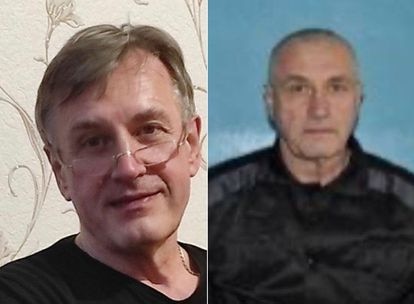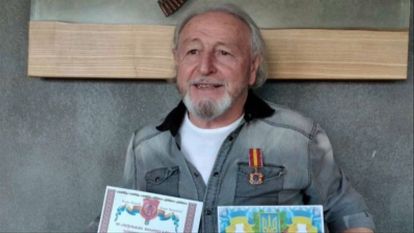Russia’s invasion of Ukraine has led to thousands of civilians being locked up in secret Russian prisons, with no formal charges, no rights and almost no identity, placing them in a limbo that contravenes international law. One such prisoner is Igor Steblevski. His story is harrowing. It is recounted by his son, Roman. The 38-year-old provides the details slowly, skeptically and incredulously. Steblevski lived in Hostomel with his wife, around 30 kilometers (18.5 miles) northwest of Kyiv. Russian troops entered the town on February 24, 2022, the first day of the invasion. Almost a month later, on March 22, a mortar shell wounded Steblevski’s wife, Liudmila Shevchenko, while she was in the kitchen. He was then 62 years old and she was 54. He asked the Russian military to help him take her to a hospital in an armored car. That was when Steblevski’s confinement began. A few weeks ago, Roman saw a picture of him, his head shaved, on an unofficial Russian website reporting on his captivity.
The Ukrainian Center for Civil Liberties (CLC), last year’s Nobel Peace Prize laureate, has documented 4,000 cases of Ukrainian civilians being held in Russian jails since the beginning of the Kremlin’s offensive, although the organization believes the real figure may be much higher. The Ukrainian Commissioner for Human Rights, Dmytro Lubinets, puts the number as high as 20,000.
The road to this black hole begins with the arrest of a Ukrainian citizen by Russian forces in the occupied territories. The detainee is usually accused of jeopardizing their operations. They are then sent to a “filtration camp,” where they are searched and interrogated. From there they are transferred to a Russian prison, usually via neighboring Belarus, particularly in the case of those who, like Steblevski, were detained in the center of the country. And then the key is thrown away, and they enter a wartime limbo.

The first major difficulty for the families of the detainees is finding out if they are still alive, and where they are. Roman has tried everything since he lost contact with his father. An engineer by training, he runs a glass company in Vishneve, southwest of Kyiv, where the Russians failed to reach. He spoke to his father once a week. “The snipers,” he says from his office, “were shooting at those they saw with cellphones.”
Roman contacted neighbors of his parents and volunteers from the municipality. He searched social networks and reported the disappearance to missing persons agencies, NGOs, and the police. It took him 10 days to reconstruct what happened; that while his father was attempting to help his mother, they were separated and never saw each other again. Roman prefers not to pursue Shevchenko’s story out of respect for his elderly mother, who is still waiting for news of her husband.
He kept up his search for weeks, finding out if any of those who had been released had seen his father. Two former detainees said that they had: “One of them gave me details about my father that he could only know if he had shared a cell with him,” he says. They told him that they had met Steblevski in a Russian prison in Bryansk, some 380 kilometers (236 miles) southwest of Moscow. That same prison is where the CLC believes Roman’s father had been held at some point. His whereabouts are now unknown. The Bryansk prison was undergoing renovations and the prisoners were probably transferred.
In November 2022, Roman eventually received a letter from the Russian Interior Ministry informing him that his father was indeed under arrest. “They tell me,” he says while displaying the letter on his cellphone, “that my father was detained for resisting the special military operation [in Ukraine], that he is on Russian territory and that his health is satisfactory.” Roman is not very convinced by this, because his father suffers from heart problems.

“We have to make them afraid of us”
Mikhail Savva, a 54-year-old Russian-born doctor of political science, knows what one of these prisons is like. He spent eight months in a Krasnodar jail for defending human rights, a punishable offense in Russia. A refugee in Ukraine since 2015, Savva is a member of the CLC Council of Experts. He explains that the council gets information about civilian prisoners and work on securing their release through their lawyers on Russian territory, respecting the legal framework but seeking cracks in it. “Russia cannot deny the existence of human rights and we exploit that loophole.” He puts it another way: “We have to make them afraid of us, afraid to torture.”
An example to understand this process is that of 75-year-old Spaniard Mariano García Calatayud. “We sent 50 requests, literally, and they only answered one. It was the Prosecutor’s Office of Crimea [under Russian occupation], last April,” says Savva. The response said that García Calatayud was being held for endangering Russia’s security. He had been working for eight years in Kherson province, assisting children displaced by the Donbas war in the east, which began in 2014. In March 2022, he took part in a demonstration against the Russian occupation and was arrested.
As Savva explains, the Russian prosecuting authority maintains that investigations are ongoing. “International law does not provide for something like this to last a year and a half,” he says. But the same thing is happening to the rest of the Ukrainian prisoners. “If the investigation had ended and there was an open case,” Savva continues, “he would have the right to be assisted by a lawyer there.” But this is not what happens. Again, limbo: they are neither prisoners of war, nor detained under a firm charge. Many believe they are simply hostages of the Kremlin’s war.
García Calatayud has been held in a prison in Simferopol that was built last autumn. This information was not provided by the Russian Prosecutor’s Office, but by former inmates, who say that he speaks in Spanish, very loudly, using a lot of swear words… “They also say,” Savva continues, “that he has scars, bruises, that he may have been beaten… at 75 years old.” The CLC argues that pressure from Spain would help his cause. The Spanish Foreign Ministry said after learning of García Calatayud’s arrest that it is following the case and is in contact with his family.
Savva has the same feeling that Roman Steblevski expresses after months of searching for his father. “I would not say that it is more difficult to find a civilian than a soldier,” says the CLC expert, “but it is more difficult to get them released.” So far, the CLC has recorded 340 cases of civilians being released. The Ukrainian government is working on the issue with the coordination center for the treatment of prisoners of war, under the command of General Kyrylo Budanov, head of military intelligence, and the Red Cross. On Monday, the release of a further 22 Ukrainian citizens was announced. But these were servicemen and benefited from an exchange with Russia.
Sign up for our weekly newsletter to get more English-language news coverage from EL PAÍS USA Edition
This post was originally published on this site be sure to check out more of their content.






